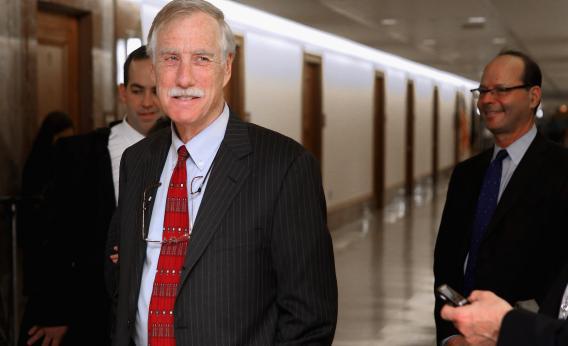It was the second least-mysterious mystery of the day. Sen.-elect Angus King of Maine, a former governor with gravitas to spare, ran as an independent. He refused to say which party he’d caucus with if/when he got to Washington. Republicans (led by the Chamber of Commerce) spent millions on ads meant to drive his numbers down and allow their candidate to win a three-way split. But King won more than 50 percent of the vote. And he wasn’t bitter. This morning, when King called a press conference to announce whether he’d caucus at all, a reporter asked whether the negative ads affected his decision at all.
“I can honestly look you in the eye and say, Zero,” he said. “That’s history.”
King took his podium and unfolded a speech that would take six minutes to read. He realized that he had to caucus if he wanted to have a real role in the Senate. Which party to choose? “The outcome of last week’s elections, in some ways, makes this decision relatively easy,” he said. “In a stuation where one party has a clear majority, and effectiveness is an important criterion, affiliating with the majority makes the most sense. The majority has more committee slots to fill, has more control over what bills get considered, and more control over the Senate schedule.”
He was unsentimental about it. He wanted to get on the Finance Committee, even though freshmen were at a disadvantage for that job. “My father used to say, if you don’t ask, you don’t get,” he said. He had talked to Harry Reid and both of the Senate’s independents, who caucus with Democrats, to learn the ropes, and came away sounding sympatico. “The filibuster’s use, in recent years, has been excessive.” Finally, he got asked whether he thought about joining the other team.
“I did not speak to Sen. McConnell,” he said. “I did, however, speak to Sen. Blunt, who is the second leader in the Republican caucus. I also heard from Sen. Corker, Sen. Johanns, and a number of other Republicans.” Why not McConnell? “He didn’t contact me.” Would he ever caucus with those guys, though, if they won the Senate? “It would be a question of the majority, and it would be a question of my ability to maintain independence.”
